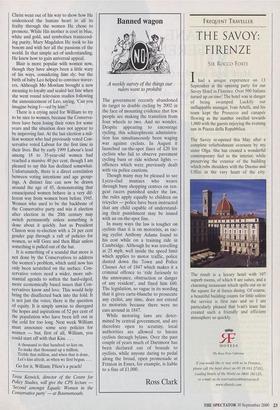Banned wagon
A weekly survey of the things our rulers want to prohibit
The government recently abandoned its target to double cycling by 2002 in the face of mounting evidence that few people are making the transition from four wheels to two. And no wonder. Despite appearing to encourage cycling, this schizophrenic administra- tion has simultaneously been waging war against cyclists. In August it launched on-the-spot fines of £20 for cyclists who fail to observe pavement cycling bans or ride without lights offences which were previously dealt with via police cautions.
Though many may be pleased to see Lycra-clad maniacs who weave through busy shopping centres on ten- gear racers punished under the law, the rules apply equally to children on tricycles — police have been instructed that any child capable of understand- ing their punishment may be issued with an on-the-spot fine.
In many ways the law is tougher on cyclists than it is on motorists, as rac- ing cyclist Anthony Adams found to his cost while on a training ride in Cambridge. Although he was travelling at 25 mph, well inside the speed limit which applies to motor traffic, police dusted down the Town and Police Clauses Act of 1847 which makes it a criminal offence to 'ride furiously to the annoyance, obstruction or danger of any resident', and fined him £60. The legislation, so vague in its wording that it gives carte-blanche to prosecute any cyclist, any time, does not extend to motorists because there were no cars around in 1847.
While motoring laws are deter- mined by central government, and are therefore open to scrutiny, local authorities are allowed to harass cyclists through bylaws. Over the past couple of years much of Dartmoor has been declared out of bounds to cyclists, while anyone daring to pedal along the broad, open promenade at Frinton in Essex, for example, is liable to a fine of £1,000.
Ross Clark


























































































 Previous page
Previous page